| Srl | Item |
| 1 |
ID:
061826
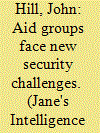

|
|
|
| 2 |
ID:
055640
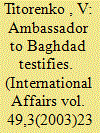

|
|
|
| 3 |
ID:
097158
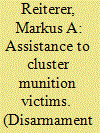

|
|
|
| 4 |
ID:
111218
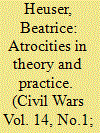

|
|
|
|
|
| Publication |
2012.
|
| Summary/Abstract |
Classical counterinsurgency theory - written before the 19th century - has generally strongly opposed atrocities, as have theoreticians writing on how to conduct insurgencies. For a variety of reasons - ranging from pragmatic to religious or humanitarian - theoreticians of both groups have urged the lenient treatment of civilians associated with the enemy camp, although there is a marked pattern of exceptions, for example, where heretics or populations of cities refusing to surrender to besieging armies are concerned. And yet atrocities - defined here as acts of violence against the unarmed (non-combatants, or wounded or imprisoned enemy soldiers), or needlessly painful and/or humiliating treatment of enemy combatants, beyond any action needed to incapacitate or disarm them - occur frequently in small wars. Examples abound where these exhortations have been ignored, both by forces engaged in an insurgency and by forces trying to put down a rebellion. Why have so many atrocities been committed in war if so many arguments have been put forward against them? This is the basic puzzle for which the individual contributions to this special issue are seeking to find tentative answers, drawing on case studies.
|
|
|
|
|
|
|
|
|
|
|
|
|
|
|
|
| 5 |
ID:
101766
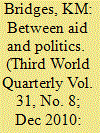

|
|
|
|
|
| Publication |
2010.
|
| Summary/Abstract |
Humanitarian advocacy is emblematic of the relief community's desire to move beyond simply treating the symptoms of suffering, and towards tackling the causes. As such, advocacy is at the front line of debates over where the boundaries between aid and politics should now be drawn and the point where dissension on the subject is most evident. In this paper the challenge that advocacy poses for traditional humanitarian operations in Darfur and the effect of such political engagement on humanitarian identity more generally is assessed. Disagreement among humanitarian organisations is exacerbated by the continued tendency of aid agencies to privilege reaction over reflection. Floundering between unachievable traditional humanitarian principles and the failure of human rights to provide an adequate alternative, humanitarianism is swiftly losing both its identity and its legitimacy. To emerge from the fog of confusion humanitarianism must now take on the professionalism of military science and endeavour to better know both itself and its enemies.
|
|
|
|
|
|
|
|
|
|
|
|
|
|
|
|
| 6 |
ID:
099025
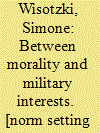

|
|
|
|
|
| Publication |
Frankfurt, Peace Research Institute Frankfurt (PRIF), 2010.
|
| Description |
34p.
|
| Series |
PRIF reports no. 2
|
| Standard Number |
9783937829982
|
|
|
|
|
|
|
|
|
|
|
|
Copies: C:1/I:0,R:0,Q:0
Circulation
| Accession# | Call# | Current Location | Status | Policy | Location |
| 055257 | 327.174/WIS 055257 | Main | On Shelf | General | |
|
|
|
|
| 7 |
ID:
097200
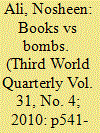

|
|
|
|
|
| Publication |
2010.
|
| Summary/Abstract |
Through the lens of the new institutional economics development is represented as a process of cultural and institutional transformation in which informal social institutions that hinder the operation of market forces are dismantled and replaced with formalised, liberal institutional frameworks to facilitate rational economic activity. The World Bank has deployed these arguments to legitimise reforms aimed at reshaping the values and conduct of postcolonial citizenries to facilitate entrepreneurship and competitiveness. To deconstruct this discourse, the article points to its underlying contradictions; specifically, to the way that the idealised formal rationality of impersonal markets is necessarily subsumed in practice within the substantive irrationalities of capitalist development. Consequently the informal social relations that the Bank deems instances of cultural atavism and a barrier to competitiveness arise as intrinsic features of global capitalism. Seemingly impervious to reform, informalised populations appear as objects to be restrained or removed by the state. Coercion, I argue, emerges as the inevitable concomitant of competitiveness.
|
|
|
|
|
|
|
|
|
|
|
|
|
|
|
|
| 8 |
ID:
128204
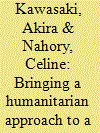

|
|
|
|
|
| Publication |
2013.
|
| Summary/Abstract |
Focusing on the human, environmental and humanitarian consequences of WMD, with civil society playing an active role, could bring about a paradigm shift.
|
|
|
|
|
|
|
|
|
|
|
|
|
|
|
|
| 9 |
ID:
139296
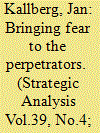

|
|
|
|
|
| Summary/Abstract |
Humanitarian cyber operations would allow democratic states to utilise cyber operations as a humanitarian intervention to capture information and create a foundation for decision making for collective international action supported by humanitarian international law. This follows the legal doctrine of responsibility to protect, which relies first on the nation state itself but when the state fails to protect its citizens, then the international community can act, ignoring the repressive or failed state’s national sovereignty.
|
|
|
|
|
|
|
|
|
|
|
|
|
|
|
|
| 10 |
ID:
117663
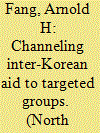

|
|
|
| 11 |
ID:
100592
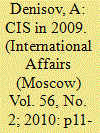

|
|
|
|
|
| Publication |
2010.
|
| Summary/Abstract |
THE SPACE of the Commonwealth of Independent States (CIS) remained a Russian foreign policy priority in 2009. These countries are our close neighbors and strategic partners with which we have common tasks of economic development and modernization, ensuring regional security and achieving a more just world order. Respective principles have been repeatedly confirmed at the highest possible political level, including in D. A. Medvedev's programmatic article, "Forward, Russia!" which was published in September 2009. The correctness of this line was confirmed by the overall development of international processes in 2009, characterized by the growing regionalization of global politics not least under the impact of a global financial and economic crisis and movement toward a polycentric international system.
|
|
|
|
|
|
|
|
|
|
|
|
|
|
|
|
| 12 |
ID:
111742
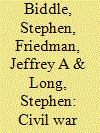

|
|
|
|
|
| Publication |
2012.
|
| Summary/Abstract |
Outside intervention in civil warfare is important for humanitarian, theoretical, and practical policy reasons-since 2006, much of the debate over the war in Iraq has turned on the danger of external intervention if the United States were to withdraw. Yet, the literature on intervention has been compartmented in ways that have made it theoretically incomplete and unsuitable as a guide to policy. We therefore integrate and expand upon the theoretical and empirical work on intervention and apply the results to the policy debate over the US presence in Iraq using a Monte Carlo simulation to build upon the dyadic results of probit analysis. We find that Iraq is, in fact, a significantly intervention-prone conflict in an empirical context; the prospect of a wider, regional war in the event that violence returns in the aftermath of US withdrawal cannot safely be ignored.
|
|
|
|
|
|
|
|
|
|
|
|
|
|
|
|
| 13 |
ID:
086329
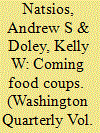

|
|
|
|
|
| Publication |
2009.
|
| Summary/Abstract |
The doubling of grain prices over the past years has already set off violent protests in over 30 developing counteries and led to the overthrow to the Haitian prime minister Jacques Edouard Alexis.Even though the media has provided extensive coverage and analysis of the causes of the increase in food prices, the potential political and security consequences have been given little attention.
|
|
|
|
|
|
|
|
|
|
|
|
|
|
|
|
| 14 |
ID:
099104


|
|
|
|
|
| Publication |
2010.
|
| Summary/Abstract |
Do members of Congress put human rights concerns on the agenda in response to their constituents' demands for trade protection? Humanitarian concern may be an important motive, but the normative weight of these issues also makes them a potentially powerful tool for politicians with less elevated agendas. They may criticize the behavior of countries with whom their constituents must compete economically, while overlooking the actions of countries with which their constituents have more harmonious economic relations. This paper tests several hypotheses about the salience of human rights concerns in the politics of US foreign policy using data on congressional speeches during the late 1990s gathered from the Congressional Record. We find evidence that, while humanitarian interests remain an important motive for raising human rights issues, the economic interests of their constituents influence which members of Congress speak out on these questions, and the countries on which they focus their concern.
|
|
|
|
|
|
|
|
|
|
|
|
|
|
|
|
| 15 |
ID:
069181
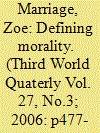

|
|
|
| 16 |
ID:
062568
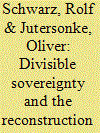

|
|
|
| 17 |
ID:
085346
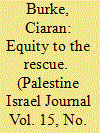

|
|
|
|
|
| Publication |
2008.
|
| Summary/Abstract |
The United Nation Charter war-i.e., the use of force by states across borders - illegal in all but two circumstances, these being self-defense and collective action authorized by the Security Council.
|
|
|
|
|
|
|
|
|
|
|
|
|
|
|
|
| 18 |
ID:
118663
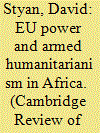

|
|
|
|
|
| Publication |
2012.
|
| Summary/Abstract |
This article analyses the European Union's (EU's) largest European Security and Defence Policy (ESDP) military mission outside Europe to date; Eufor Tchad/RCA was a 3700-strong force involving personnel from 23 states, deployed to Chad and the Central African Republic for 12 months from March 2008. Far from this mission achieving EU 'supremacy' or projecting an 'imperial' reach, an evaluation of its objectives and achievements reveals acute limitations in the EU's ability to project power. The article analyses the context in which Eufor was conceived and deployed. It notes that the mission's weaknesses, like those of the United Nations mission to whom the EU transferred its security role in 2009, reflected its convoluted origins and objectives. Finally, the article examines whether the EU as a unitary actor has the desire or the ability to 'replace' individual European nations-in this case France-in their post-colonial military and 'humanitarian' roles in sub-Saharan Africa.
|
|
|
|
|
|
|
|
|
|
|
|
|
|
|
|
| 19 |
ID:
098153
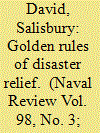

|
|
|
| 20 |
ID:
092340
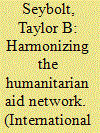

|
|
|
|
|
| Publication |
2009.
|
| Summary/Abstract |
Humanitarian aid operations save many lives, but they also fail to help many people and can have unintended political consequences. A major reason for the deficit is poor coordination among organizations. In contrast to "lessons learned" studies that dominate the literature on this topic, this article uses systemic network theory, drawn from business management literature. It presents the humanitarian aid community as a complex, open, adaptive system, in which interaction of structure and processes explain the quality of the response to environmental demands. Comparison of aid operations in Rwanda in 1994 and Afghanistan in 2001 probes the argument that the humanitarian system is becoming more effective by developing characteristics of a network through goal-directed behavior of participating organizations. The study finds development of network characteristics in the system when clusters of organizations learn to coordinate more closely, but the system is constrained by the workload of a crisis environment, lack of trust among organizations, and the political interests of donor governments.
|
|
|
|
|
|
|
|
|
|
|
|
|
|
|
|